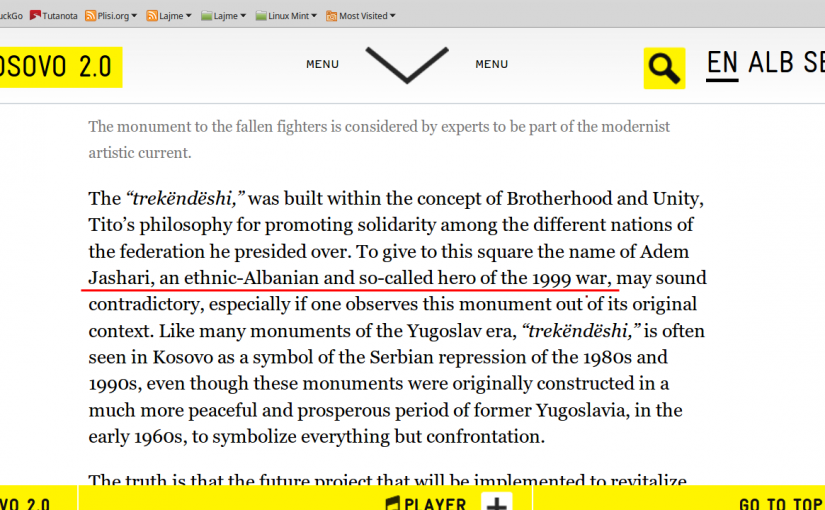A shamefully biased article about Prishtinë’s cityscape appeared last week on the Kosovo 2.0 magazine online edition. Author Cristina Marí tops it all by calling the nation’s respected warrior Adem Jashari a ‘so-called hero’.
And while I’ve tried to understand her strict criteria for defining heroes and heroism, I cannot understand the double standards she applies. Ms Cristina Marí writes about the ‘Monument to Heroes of the National Liberation Movement’, never naming it a ‘Monument to so-called Heroes…’. But when she mentions Adem Jashari, she surprisingly — or intentionally — adds a qualifier: ‘so-called hero’.
This is adding insult to injury. The Serbian criminals who killed Adem Jashari and massacred his family must be very pleased to read such an article written and published in the middle of Prishtinë. For I don’t believe they’d have the gall to do so, now and in Prishtinë, as Ms Marí does.
This clearly shows not only the increasing denial of Serbian crimes in Kosovë, but also the brashness of some journalistic hacks with anti-Albanian sentiments.
Even the term ‘National Liberation Movement’ makes no sense at all to anyone with a basic knowledge of Kosovë history. The movement began during World War II with the idea of national liberation, accompanied by enticing promises of equality and Kosovë’s unification with Albania at the end of the conflict.
As we know today this never took place. As far as Albanians in Kosovë, and other Albanian-inhabited territories in the former Yugoslavia, are concerned, the arrival of Italian and German armies meant liberation from a Serbian occupation, which was far worse than one can imagine.
Under Italy and later Germany, Kosovë Albanians — for the first time in their modern history — had an administration, schools and other institutions in their own language. To anyone of sound mind this would be, by all means, a liberation from the horrifying treatment, massacres, expulsions and mass killings by the Serbian/Yugoslav regime.
The end of World War II, for Albanians, was anything but ‘liberation’. It is true that some Albanian fighters who joined the partisan movement hoped that Albania and Kosovë would reunite, as it was agreed in the Bujan Conference and the Mukje Agreement in 1943. But the end of the war clearly showed that this was a well-planned deception by Serbian authorities.
Kosovë was put under military rule, hundreds of Albanian villages (mainly in Drenicë) were burned down by Serbian partisans and thousands of people were executed on the spot, many more arrested, tortured and imprisoned.
If someone like Ms Mari calls this a ‘liberation’, we then have a confusion of terminology.
As is understood, there was never such a thing as ‘Brotherhood and Unity’, either. There were some bearable periods, depending on the climate of rivalry and struggle within the political establishment of Yugoslavia, but that didn’t make much of a difference, as the rise of Milošević showed during the regime’s final stage.
This is how we come to Adem Jashari. Ms Marí — by her own criteria — should have named the obelisk ‘of so-called Heroes’. Or, she shouldn’t have called Jashari — one of the greatest Albanians of all times — a ‘so-called hero’.
The English Oxford dictionary defines hero as ‘[a] person who is admired for their courage, outstanding achievements, or noble qualities’, and gives ‘a war hero’ as an example. The Cambridge Dictionary has this definition: ‘a person who is admired for having done something very brave or having achieved something great.’
I can’t think of a person of greater courage and nobler qualities than Adem Jashari, whether in Albanian history or our European and world history. The Kosovar hero sacrificed not only his own life but his entire family for the liberation and independence of Kosovë.
The ‘Monument to Heroes of the National Liberation Movement’ represents no liberation movement at all. It represents only the broken promises of freedom and the repression and massacres the Albanians suffered after World War II. The only sound solution would be to — at the very least — relocate the heinous structure to a place where it can remind Albanians of their sorrowful memories.
Read this in Albanian: Lexoje shqip
Shkurtegëza për këtë postim: http://pli.si/1Ho3ujs


